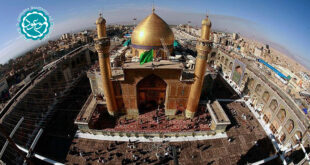In this case, the Qur’an is the third book that Jesus will be taught. But this will be possible only when he returns to Earth, for he lived 600 years before the Qur’an’s revelation. As we will see in great detail in the following chapters, the hadiths reveal that Jesus will rule with the Qur’an, not the Gospel, on his second coming. This corresponds with the verse’s meaning.
“The likeness of Jesus in God’s sight is the same as Adam.”
The verse above (Surah Al ‘Imran, 3:59) could also indicate Jesus’ return. Muslim scholars who have written Qur’anic commentaries point out that this verse indicates the fact that both Prophets did not have a father, for God created both of them with the command “Be!” However, the verse could also have another meaning: Just as Adam was sent down to Earth from God’s presence, Jesus will be sent down to Earth from God’s presence during the End Times.
As we have seen, the verses regarding Jesus’ return are very clear. As the Qur’an does not use such expressions for any other Prophet, its meaning is fairly obvious.
“… The day I was born, the day I die, and the day I am raised up again alive…”
Surah Maryam also mentions Jesus’ death in the following verse:
[Jesus said,] “Peace be upon me the day I was born, the day I die, and the day I am raised up again alive.” (Surah Maryam, 19:33)
When this verse is considered in conjunction with Surah Al ‘Imran 55, an important reality emerges: While Surah Al ‘Imran states that Jesus was raised up to God’s presence and does not mention that he died or was killed, Surah Maryam speaks of the day on which he will die. This second death can only be possible after he returns and lives on Earth for a period of time. (Only God knows for certain.)
“… You could speak to people in the cradle and when you were fully grown”
Another piece of evidence for Jesus’ return is the word kahlaan, used Surat al-Ma’ida 110 and Surah Al ‘Imran 46. These verses say:
Remember when God said: “Jesus, son of Mary, remember My blessing to you and to your mother when I reinforced you with the Purest Spirit so that you could speak to people in the cradle and when you were fully grown [kahlaan]” (Surat al-Ma’ida, 5:110)
He will speak to people in the cradle, and also when fully grown [kahlaan], and will be one of the righteous. (Surah Al ‘Imran, 3:46)
Kahlaan, which is used only in these two verses, only in reference to Jesus, and to express Jesus’ adulthood means “someone between the age of 30 and 50, someone who is no longer young, someone who has reached the perfect age.” Islamic scholars agree that it denotes the age of 35 or above. They base their views on a hadith reported by Ibn ‘Abbas that Jesus was raised up to God’s presence in his early 30s, and that he will live for 40 years when he comes again. Therefore, they suggest that this verse is evidence for Jesus’ return, since his old age will occur following his second coming.2 (Only God knows for certain.)
Close study of the relevant verses easily shows how right Islamic scholars are on this question. For example, this expression is used only with regard to Jesus. Although all of the Prophets spoke with their people, invited them to religion, and communicated their message at a mature age, the Qur’an does not use such expressions when talking about them. Rather, they are used only to voice a miraculous situation, because the expressions “in the cradle” and “when fully grown,” when used one after the other, refer to two miraculous events.
In The Commentary of at-Tabari, Imam at-Tabari gives the following explanation of these verses:
These statements [Surat al-Ma’ida 110] indicate that in order to complete his lifespan and speak to people when fully grown, Jesus will come down from heaven. That is because he was raised to heaven when still young. In this verse [Surah Al ‘Imran 46], there is evidence that Jesus is living, and the Ahl al-Sunnah share that view. That is because in this verse it is stated that he will speak to people when fully grown. He will be able to grow fully only when he returns to Earth from heaven.3
The meanings of kahlaan, as well as the other information provided by the Qur’an, indicate Jesus’ second coming in the End Times and that he will guide people to the true religion of Islam (only God knows for certain). No doubt, this is good news and a grace and gift of God for those who believe. The believers are responsible for supporting and defending him in the most appropriate way, and for living wholeheartedly the Qur’anic morality to which he calls them.
Comparable Events Mentioned in the Qur’an
The Qur’an mentions similar events, such as a person being resurrected after being dead for a long time and sleeping for hundreds of years that are comparable to Jesus’ situation. Some of these are as follows:
The man resurrected after one hundred years
One of these examples is that of a man who had been dead for one hundred years:
Or [consider such example as] the one who passed by a town that had fallen into ruin. He asked: “How can God restore this to life when it has died?” So God caused him to die for a hundred years, and then brought him back to life. Then He asked: “How long have you been here?” He replied: “I have been here a day or part of a day.” He said: “Not so! You have been here a hundred years. Look at your food and drink-it has not gone bad-and look at your donkey, so We can make you a Sign for all mankind. Look at the bones-how We raise them up and clothe them in flesh.” When it had become clear to him, he said: “Now I know that God has power over all things.” (Qur’an, 2:259)
As we mentioned earlier, the Qur’an say that Jesus’ soul was “taken back.” In the above verse, on the other hand, true death (mawt) is revealed. Therefore, the Qur’an reveals that God willed the resurrection of someone who had truly died.
Awakening the “Companions of the Cave” after many years
Another example is the narrative of the “Companions of the Cave.” God relates the story of a group of young people who sought refuge in the cave from their anti-religious ruler’s despotism. Their awakening is described in the following terms:
When the young men took refuge in the cave and said: “Our Lord, give us mercy directly from You and open the way for us to right guidance in our situation.” So We sealed their ears with sleep in the cave for a number of years. You would have supposed them to be awake, whereas in fact they were asleep. We moved them to the right and to the left, and at the entrance, their dog stretched out its paws. If you had looked down and seen them, you would have turned from them and run and have been filled with terror at the sight of them. That was the situation when we woke them up so they could question one another. One of them asked: “How long have you been here?” They replied: “We have been here for a day or part of a day.” They said: “Your Lord knows best how long have you been here. Send one of your number into the city with this silver you have, so he can see which food is purest and bring you some of it to eat. But he should go about with caution, so that no one is aware of you.” (Qur’an, 18:10-11, 18-19)
The Qur’an does not reveal how long they remained in the cave. Instead, the duration of this period is implied by the words “for a number of years.” People guessed that they stayed there for 309 years, for:
They stayed in their cave for three hundred years and added nine. Say: “God knows best how long they stayed. The Unseen of the heavens and Earth belongs to Him. How perfectly He sees, how well He hears! They have no protector apart from Him. Nor does He share His rule with anyone.” (Qur’an, 18:25-26)
Obviously, the duration of their stay is not the point here. What this narrative reveals is that God took some people back from this life, either by making them sleep or by taking their lives, and then restored them to life, just as people wake up from sleep. Jesus is one such person. When the appointed time comes, he will live on Earth once again, fulfill the honorable responsibility given to him by God, and then die onEarth in the normal manner, for
He said: “On it you will live and on it you will die, and from it you will be brought forth.”
(Qur’an, 7:25)
———————————————————————–
1. Elmalili Muhammad Hamdi Yazir, Kuran-i Kerim Tefsiri (Qur’an Tafsir); www.kuranikerim.com/telmalili/zuhruf.htm.
2. Muhammed Khalil Herras, Fasl al-Maqal fi raf’i ‘Isa hayyan wa nuzulihi wa qatlihi ad-Dajjal,
(Cairo: Makatabat as-Sunnah, 1990), 20.
3. Imam at-Tabari, The Commentary of at-Tabari, (Istanbul:Umit Yayincilik), 2:528; 1:247.
written by: Harun Yahya
 Mouood Mouood English Edition
Mouood Mouood English Edition




